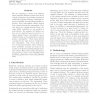140 search results - page 10 / 28 » kdd 2004 |
KDD
2004
ACM
14 years 10 months ago
2004
ACM
Procedures for collective inference make simultaneous statistical judgments about the same variables for a set of related data instances. For example, collective inference could b...
KDD
2004
ACM
14 years 10 months ago
2004
ACM
Clustering algorithms typically operate on a feature vector representation of the data and find clusters that are compact with respect to an assumed (dis)similarity measure betwee...
KDD
2004
ACM
14 years 10 months ago
2004
ACM
We use clustering to derive new relations which augment database schema used in automatic generation of predictive features in statistical relational learning. Clustering improves...
KDD
2004
ACM
14 years 3 months ago
2004
ACM
Semantic understanding of multimedia content is critical in enabling effective access to all forms of digital media data. By making large media repositories searchable, semantic ...
KDD
2004
ACM
14 years 3 months ago
2004
ACM
Randomization is an economical and efficient approach for privacy preserving data mining (PPDM). In order to guarantee the performance of data mining and the protection of individ...


